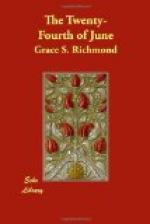“I suspect it is,” Richard agreed with conviction. Certainly, a girl who would run away from such adulation as she had been receiving must be, he considered, decidedly and interestingly “different.” He only wished he might hit upon some “different” way to pique her interest.
CHAPTER XII
BLANKETS
There was destined to be a still longer break in the work which had been going on in Judge Calvin Gray’s library than was intended. He and his assistant had barely resumed their labours after the Christmas house-party when the Judge was called out of town for a period whose limit when he left he was unable to fix. He could leave little for Richard to do, so that young man found his time again upon his hands and himself unable to dispose of it to advantage.
His mind at this period was in a curious state of dissatisfaction. Ever since the evening of the Christmas dance, when a girl’s careless word had struck home with such unexpected force he had been as restless and uneasy as a fish out of water. His condition bore as much resemblance to that of the gasping fish as this: in the old element of life about town, as he had been in the habit of living it, he now had the sensation of not being able to breathe freely.
It was with the intention of getting into the open, both mentally and physically, that on the second day following the Judge’s departure Richard started on a long drive in his car. Beyond a certain limit he knew that the roads were likely to prove none too good, though the winter had thus far been an open one and there was little chance of his encountering blocking snowdrifts “up State.” He took no one with him. He could think of no one with whom he cared to go.
As he drove his mind was busy with all sorts of speculations. In his hurt pride he had said to a girl: “If I can’t make you think differently of me it won’t be for lack of will.” That meant—what did it mean? That he had recognized the fact that she despised idlers—and that young rich men who spent a few hours, on an average of five days of the week, in assisting elderly gentlemen bereft of their eyesight in looking up old records, did not thereby in her estimation remove themselves from the class of those who do nothing in the world but attend to the spending of their incomes.
What should he do—how prove himself fit to deserve her approval? Unquestionably he must devote himself seriously to some serious occupation. All sorts of ideas chased one another through his mind in response to this stimulus. What was he fitted to do? He had a certain facility in the use of the pen, as he had proved in the service of Judge Calvin Gray. Should he look for a job as reporter on one of the city dailies? He certainly could not offer himself for any post higher than that of the rawest scribe on the force; he had had no experience. The thought of seeking such a post made his lip curl with the absurdity of the notion. They would make a society reporter of him; it would be the first idea that would occur to them. It was the only thing for which they would think him fit!




